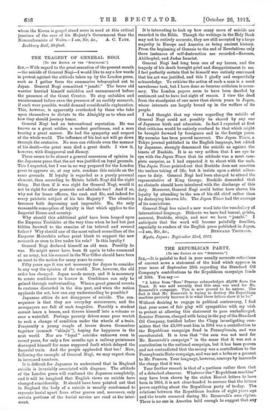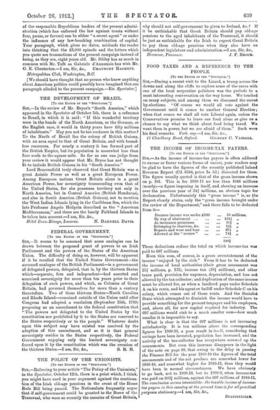THE REPUBLICAN PARTY.
1To THE EDITOR Or THE " SPECTATOR.•']
Sin,—It is painful to find in your usually accurate reflections of current news a statement of the kind which appears in your issue of September 28th regarding the Standard Oil Company's contributions to the Republican campaign funds of 1904. You say :-
"A letter from 'Boss' Penrose acknowledges X5,000 from the Trust. It was said recently that this sum was used for Mr. Roosevelt's campaign. This is now proved to be untrue. The fact is that Mr. Roosevelt is trying to destroy the Republican machine precisely because it is what these letters show it to be."
Without desiring to engage in political controversy, I feel that your sense of fair play will sympathize with my wish to protest at allowing this statement to pass unchallenged.
Senator Penrose, charged with being in the pay of the Standard Oil Company, testified before the Clapp investigating com- mittee that the £5,000 sent him in 1904 was a contribution to the Republican campaign fund in Pennsylvania, and was corroborated. It is true that "the sum was not used for Mr. Roosevelt's campaign" in the sense that it was not a contribution to the national campaign, but it has been proven and not contradicted that the money was a contribution to the Pennsylvania State campaign, and was not a. bribe or a present to Mr. Penrose. Your language, however, conveys by innuendo the charge that it was. Your further remark is that of a partisan rather than that of a detached observer. Whatever the " Republican machine" may have been shown by the stolen Hearst letters to have been in 1904, it is not clear-headed to assume that the letters prove anything about the Republican party of to-day. The relations between the Republican leaders of eight years ago and the trusts occurred during Mr. Roosevelt's own regime. There is no one in America bold enough to suggest that any
of the responsible Republican leaders of the present admini- stration (which has enforced the law against trusts without fear, pause, or favour) can be either "a secret agent" or under the influence of any law-breaking combination of capital. Your paragraph, which gives no dates, misleads the reader into thinking that the £5,000 episode and the letters which you quote are transactions of the present campaign instead of being, as they are, eight years old. Mr. Sibley has as much in common with Mr. Taft as Gabriele d'Annunzio has with Mr. G. K. Chesterton.—I am, Sir, &a., CHAUNCEY His.cirxrr.
Metropolitan Club, Washington, D.C.
[We should have thought that no person who knew anything about American politics could possibly have imagined that our paragraph alluded to the present campaign.—En. Spectator.]



















































 Previous page
Previous page